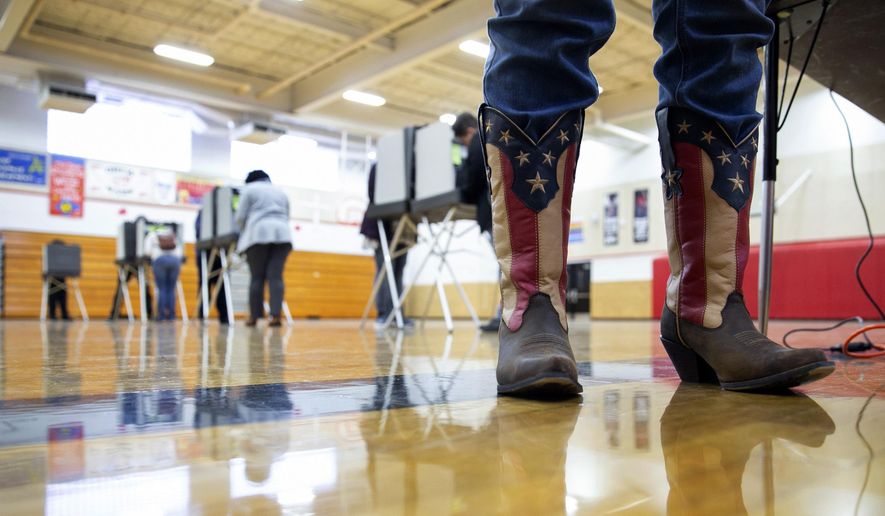With anger at President Trump boiling over, Democrats steamrolled to victory in Virginia’s elections Tuesday, claiming majorities in both chambers of the General Assembly for the first time in two decades.
They captured Republican-held Senate seats in Northern Virginia and the Richmond area, according to unofficial returns, giving Democrats enough for control, with other pickups possible.
In the House, where new district maps imposed by a court tilted the playing field toward Democrats, they claimed at least four wins and had a couple of more races in sight, according to the Virginia Public Access Project.
Democrats also appeared to have defended every one of their seats in both chambers, including reelecting Delegate Danica Roem, who broke ground two years ago winning as an openly transgender politician, and Delegate Lee Carter, who bills himself as a democratic socialist.
“Tonight, Virginia Democrats have once again made history. Starting this January, for the first time in decades, Democrats will control the House, Senate and the governor’s office,” said Susan Swecker, chairwoman of the state party.
Liberal groups nationally said the results are proof that the anti-Trump Democratic wave that began in Virginia in 2017 and carried through last year’s congressional elections nationally will crest again next year.
“What has happened here in Virginia’s elections will reverberate throughout the country,” said Michael Keegan, president of the liberal activist group People for the American Way. “Flipping the General Assembly of this once-red state to blue puts Republicans on notice that voters have had enough of Donald Trump, Republicans, and their dangerous and divisive agenda.”
Indeed, voters said there was no doubt Mr. Trump was on their minds when they cast ballots — with the intensity far higher among Democrats.
“I just wanted to go against Trump. I find him absolutely repugnant,” said Peggy Chenoweth, 45, who voted for Democrats in a Senate seat in Loudoun and Prince William counties that flipped away from Republican control.
Sri Amudhanar, the Democratic candidate for Loudoun County Commissioner of the Revenue, said it was impossible to divorce Mr. Trump from the day’s races.
“They cannot separate them because the pull of national politics is so hard,” he said.
All 40 seats in the state’s Senate and all 100 seats in the House of Delegates were on the ballot, though only a handful of races were expected to decide control.
Republicans went into the night with an effective 51-49 lead in the House and a 21-19 edge in the Senate.
Democrats’ big night means the next session of the General Assembly will look dramatically different.
The federal Equal Rights Amendment could earn ratification in the state legislature after being blocked by Republicans. The state’s minimum wage could rise, and Virginia’s status as a right-to-work state could be challenged.
But the biggest change is likely to be on guns, where this year’s high-profile mass shootings, including one in Virginia Beach, roiled Richmond. Gov. Ralph Northam, a Democrat, forced a special legislative session this summer to deal with guns, but the Republicans punted the issue to the state’s crime commission for more study and adjourned after 90 minutes.
Democrats ran heavily on the issue, aided by millions of dollars from gun control groups outside the state and are likely to see Tuesday’s results as a harbinger of the issue’s power on a national level.
Republicans had insisted the election would be fought on those kinds of perennial local issues, including education, spending and health care, and hoped a whiff of scandal for the state’s top three Democrats would also help Republicans.
Mr. Northam and Attorney General Mark Herring were snared in blackface incidents, and Lt. Gov. Justin Fairfax faced rape allegations.
But the scandals didn’t seem to resonate anywhere near as much as Mr. Trump did.
“We need to get rid of him,” said Maria Evans, 80, of Gainesville.
Even some Republican voters said they saw Mr. Trump as the issue.
Diane Davis, voting Republican in Loudoun County, said she always votes anyway, but she said this year’s election was “definitely” a statement of support for the president amid the impeachment push on Capitol Hill.
“Why do you want to impeach President Trump? What has he done?” she said.
Most Republican candidates across the state tried to keep Mr. Trump at arm’s length. The president didn’t campaign there and instead deployed Vice President Mike Pence for some last-minute assistance this weekend.
Virginia, which two decades ago was a massive Republican success story, has been trending blue for the past decade, with Democrats now holding both U.S. Senate seats, a 7-4 lead in the congressional delegation and the top three state offices.
Now it appears they will also hold both houses of the state assembly, giving them the trifecta of the House, Senate and governorship for the first time since the early 1990s, when Gov. L. Douglas Wilder held office.
In 2017, when the House seats were all up for election, Republicans went into the race with a 16-seat majority. They emerged with the 51-49 margin, thanks only to a coin flip that won them a tie race.
Rep. David Yancey, the Republican who won that coin flip, was steamrolled Tuesday, losing by more than 15 percentage points.
The House races this year played out on a very different field after a federal court deemed the previous map an illegal racial gerrymander. The court adopted new district lines that were more favorable to Democrats, and the results were striking Tuesday.
Ousted in the shake-up was Delegate Chris Jones, a Republican with 24 years of experience who is chairman of the House Appropriations Committee.
Holding on amid the redistricting was Delegate Kirk Cox, the House speaker — though he likely will lose that post in the new session next year.
• Stephen Dinan can be reached at sdinan@washingtontimes.com.
• David Sherfinski can be reached at dsherfinski@washingtontimes.com.




Please read our comment policy before commenting.